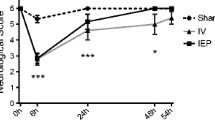Abstract
Objective and design
We evaluated the inhibitory effects of progesterone (PROG) on inflammatory response and its influence on the structure of blood–brain barrier in a permanent model of stroke.
Material
One hundred and twenty adult male Sprague-Dawley rats were used in this study.
Treatments
PROG was dissolved in 22.5% 2-hydroxypropyl-bcyclodextrin and given in a dose of 15 mg/kg by intraperitoneal injection 1 h after permanent occlusion of middle cerebral artery (pMCAO). Additional injections of 15 mg/kg were administered subcutaneously 6, 24, and 48 h after pMCAO.
Methods
The expression of tumor necrosis factor-alpha (TNF-α) and claudin5 was measured by immunohistochemistry and western blot technique. Brain water content was determined by the dry–wet weight method.
Results
TNF-α were increased, but claudin5 were reduced in vehicle-treated rats after pMCAO. PROG-treated rats showed a substantial reduction in the expression of TNF-α compared to vehicle controls. In addition, there was significant increase in the expression of claudin5 in the pMCAO rats treated with PROG compared to vehicle. Examination of the water content of the brain also revealed that administration of PROG significantly attenuated the amount of water compared to vehicle in the ipsilateral hemispheres.
Conclusions
These data indicate that PROG is beneficial in this animal model, and may warrant further test in future clinical trials for human stroke.





Similar content being viewed by others
References
Vagnerova K, Koerner IP, Hurn PD. Gender and the injured brain. Anesth Analg. 2008;107:201–14.
Vandromme M, Melton SM, Kerby JD. Progesterone in traumatic brain injury: time to move on to phase III trials. Crit Care. 2008;12:153.
Sayeed I, Wali B, Stein DG. Progesterone inhibits ischemic brain injury in a rat model of permanent middle cerebral artery occlusion. Restor Neurol Neurosci. 2007;25:151–9.
Gibson CL, Murphy SP. Progesterone enhances functional recovery after middle cerebral artery occlusion in male mice. J Cereb Blood Flow Metab. 2004;24:805–13.
Gibson CL, Constantin D, Prior MJ, Bath PM, Murphy SP. Progesterone suppresses the inflammatory response and nitric oxide synthase-2 expression following cerebral ischemia. Exp Neurol. 2005;193:522–30.
Cai W, Zhu Y, Furuya K, Li Z, Sokabe M, Chen L. Two different molecular mechanisms underlying progesterone neuroprotection against ischemic brain damage. Neuropharmacology. 2008;55:127–38.
He J, Evans CO, Hoffman SW, Oyesiku NM, et al. Progesterone and allopregnanolone reduce inflammatory cytokines after traumatic brain injury. Exp Neurol. 2004;189:404–12.
Wright DW, Bauer ME, Hoffman SW, Stein DG. Serum progesterone levels correlate with decreased cerebral edema after traumatic brain injury in male rats. J Neurotrauma. 2001;18:901–9.
Guo Q, Sayeed I, Baronne LM, Hoffman SW, Guennoun R, Stein DG. Progesterone administration modulates AQP4 expression and edema after traumatic brain injury in male rats. Exp Neurol. 2006;198:469–78.
Betz AL, Coester HC. Effect of steroids on edema and sodium uptake of the brain during focal ischemia in rats. Stroke. 1990;21:1199–204.
Ueno M, Sakamoto H, Liao YJ, Onodera M, Huang CL, Miyanaka H, et al. Blood-brain barrier disruption in the hypothalamus of young adult spontaneously hypertensive rats. Histochem Cell Biol. 2004;122:131–7.
Begley DJ, Brightman MW. Structural and functional aspects of the blood–brain barrier. Drug Res. 2003;61:39–78.
Kniesel U, Wolburg H. Tight junctions of the blood-brain barrier. Cell Mol Neurobiol. 2000;20:57–76.
Tsukita S, Furuse M. Overcoming barriers in the study of tight junction functions: from occludin to claudin. Genes Cells. 1998;3:569–73.
Cunningham LA, Wetzel M, Rosenberg GA. Multiple roles for MMPs and TIMPs in cerebral ischemia. Glia. 2005;50:329–39.
Manicone AM, McGuire JK. Matrix metalloproteinases as modulators of inflammation. Semin Cell Dev Biol. 2008;19:34–41.
Gottschall PE, Yu X. Cytokines regulate gelatinase A and B (matrix metalloproteinase 2 and 9) activity in cultured rat astrocytes. J Neurochem. 1995;64:1513–20.
Takaba H, Fukuda K, Yao H. Substrain differences, gender, and age of spontaneously hypertensive rats critically determine infarct size produced by distal middle cerebral artery occlusion. Cell Mol Neurobiol. 2004;24:589–98.
Liu T, Clark RK, McDonnell PC, Young PR, White RF, Barone FC, et al. Tumor necrosis factor-alpha expression in ischemic neurons. Stroke. 1994;25:1481–8.
Hatashita S, Hoff JT. Role of blood–brain barrier permeability in focal ischemic brain edema. Adv Neurol. 1990;52:327–33.
Xiao G, Wei J, Yan W, Wang W, Lu Z. Improved outcomes from the administration of progesterone for patients with acute severe traumatic brain injury: a randomized controlled trial. Crit Care. 2008;12:R61.
Cutler SM, Cekic M, Miller DM, Wali B, VanLandingham JW, Stein DG. Progesterone improves acute recovery after traumatic brain injury in the aged rat. J Neurotrauma. 2007;24:1475–86.
Gibson CL, Gray LJ, Bath PM, Murphy SP. Progesterone for the treatment of experimental brain injury; a systematic review. Brain. 2008;131:318–28.
Kumon Y, Kim SC, Tompkins P, Stevens A, Sakaki S, Loftus CM. Neuroprotective effect of postischemic administration of progesterone in spontaneously hypertensive rats with focal cerebral ischemia. J Neurosurg. 2000;92:848–52.
Galani R, Hoflhlan SW, Stein DG. Effeets of the duration of Progesterone treatment on the resolution of cerebrale edema induced by cortical contusion in rats. Neurosci. 2001;18:161–6.
Fisher M. Injuries to the vascular endothelium: vascular wall and endothelial dysfunction. Rev Neurol Dis. 2008;5(Suppl 1):S4–11.
de Vries HE, Blom-Roosemalen MC, van Oosten M, de Boer AG, van Berkel TJ, Breimer DD, et al. The influence of cytokines on the integrity of the blood–brain barrier in vitro. J Neuroimmunol. 2007;64:37–43.
Dziewulska D, Mossakowski MJ. Cellular expression of tumor necrosis factor a and its receptors in human ischemic stroke. Clin Neuropathol. 2003;22:35–40.
Nawashiro H, Martin D, Hallenbeck JM. Neuroprotective effects of TNF binding protein in focal cerebral ischemia. Brain Res. 1997;778:265–71.
Meistrell ME, Botchkina GI, Wang H. Tumor necrosis factor is a brain damaging cytokine in cerebral ischemia. Shock. 1997;8:341–8.
Svedin P, Hagberg H, Sävman K, Zhu C, Mallard C. Matrix metalloproteinase-9 gene knock-out protects the immature brain after cerebral hypoxia-ischemia. J Neurosci. 2007;27:1511–8.
Author information
Authors and Affiliations
Corresponding author
Additional information
Responsible Editor: I. Ahnfelt-Rønne.
Rights and permissions
About this article
Cite this article
Jiang, C., Wang, J., Li, X. et al. Progesterone exerts neuroprotective effects by inhibiting inflammatory response after stroke. Inflamm. Res. 58, 619–624 (2009). https://doi.org/10.1007/s00011-009-0032-8
Received:
Revised:
Accepted:
Published:
Issue Date:
DOI: https://doi.org/10.1007/s00011-009-0032-8




